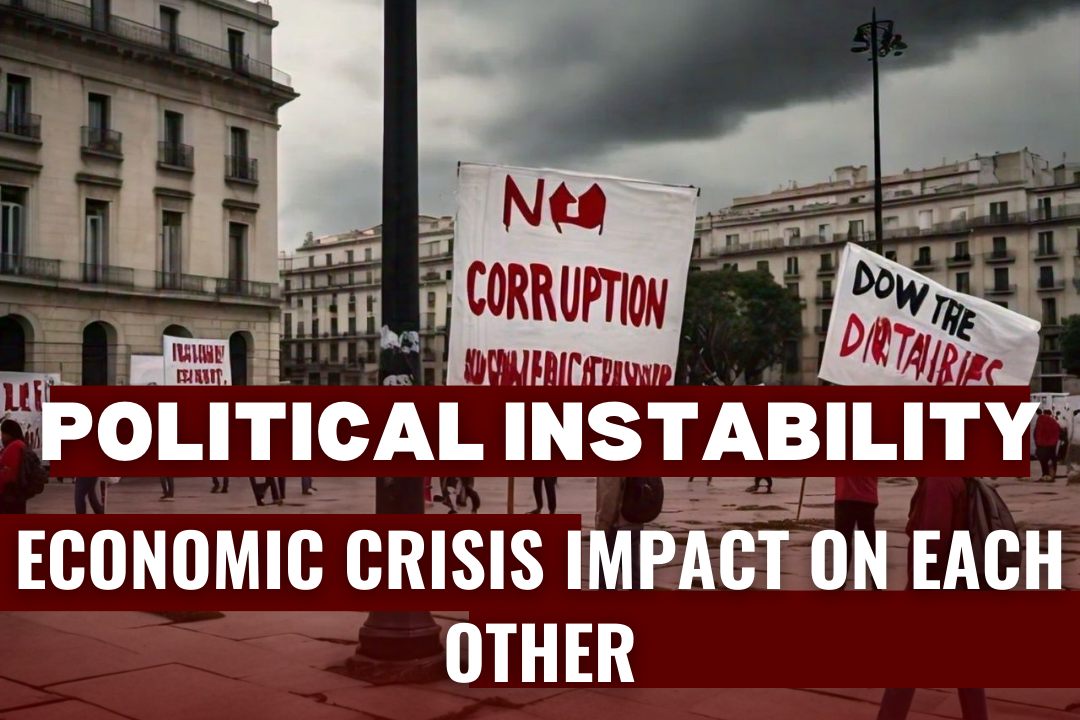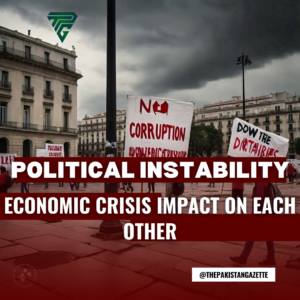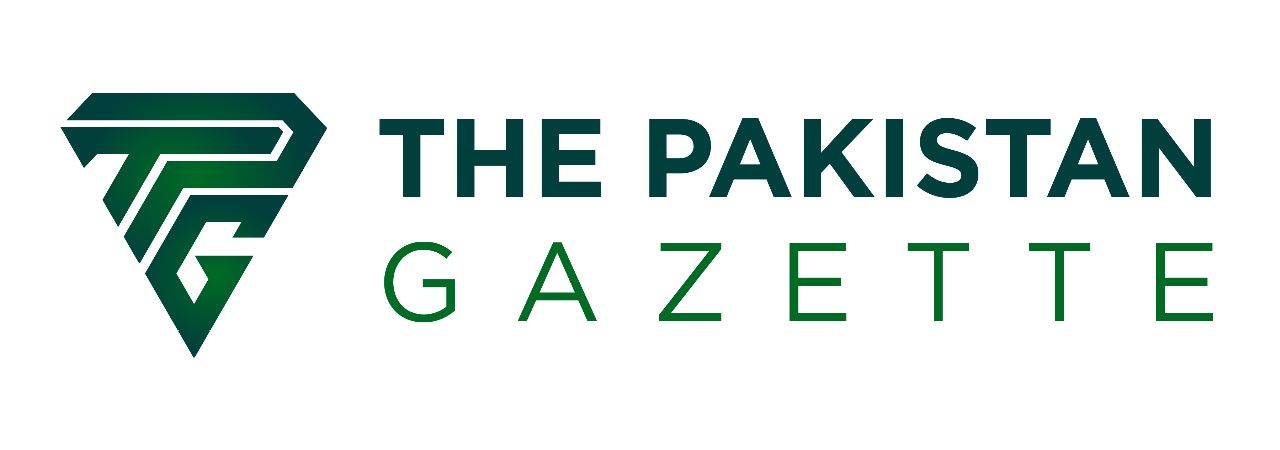
How Political Instability Affects Economy
Political instability can have profound consequences on a nation’s economic health, and Pakistan serves as a pertinent case study in this regard. Economic progress is contingent upon political stability. Political unrest can have a serious negative impact on the economy. The term “political instability” originates from Lipstel (1960), who said that a nation could not be considered stable unless it had been under a democracy or even a dictatorship for 25 years in a row. Uncertain policies and decision-making are often accompanied by economic poverty in politically unstable nations. Investors want to make investments in safer environments with less political uncertainty because they believe that frequent changes in government pose a threat to policy.

One of the main causes of political instability, which ultimately leads to public unrest in the form of strikes against governments, is the volatility of the political climate, which in turn causes inflation and unemployment. The public began to criticise the administration, sending a bad message to investors who, as a result, stopped making investments in such a hazardous climate. It is thought that macroeconomic factors and economic activity are disrupted by political instability. Political unrest therefore undermines economic objectives.
It is axiomatic that political crises have an impact on economic development and slow down economic advancement. As such, the relationship between political stability and the economy has been described as a two-way relationship by a number of social scientists. According to research on political unrest titled “The Economic Cost of General Strikes in Nepal,” caused the GDP growth rate to drop from 2.2% to 0.6%.
The strike cost is 0.46% of GDP in Austria, compared to an average of 0.1% of GDP in Spain. The average cost to Pakistan’s neighbours, Bangladesh and India, is estimated to be equivalent to 2% of GDP. Furthermore, there is a negative correlation between political unpredictability and economic investments.
PTI’s sit-in in 2014 in Islamabad led to the shutting down of business activity and the closure of trade routes, for which Pakistan faced an economic loss of 610 billion due to PTI’s long March of 126 days in Islamabad.
Impact of Political Instability on Economy in Pakistan
According to South Asia’s economic outlook for 2020, Pakistan’s growth rate was 1.9%, lower than that of Bangladesh (8.1%), Afghanistan (3.9%), and India (4.2%). Pakistan had a number of problems shortly after it was founded in 1947, the worst of which was political instability. The time of stability under the leadership of Quaid-e-Azam and Liaquat Ali Khan was short-lived, as Khawaja Nazimuddin and Malik Feroz Khan Noon led different prime ministers from 1951 to 1958. Pakistan was also experiencing a constitutional crisis at the time.
Ayub Khan’s stable military government marked a period of remarkable economic growth in Pakistan. However, the nation faced severe political turmoil in 1970, culminating in the significant economic setback of East Pakistan’s separation. The tumultuous 1990s stand as a sombre symbol of Pakistan’s economic struggles, driven by political instability leading to soaring foreign debt, declining export rates, and diminished revenues. The delay in elections and the imposition of emergency rule by Musharraf caused GDP growth to plummet from 4.8% to 1.7%. This instability was further compounded by precarious policies, fostering post-9/11 terrorism in Pakistan. The attempted assassination of Benazir Bhutto in 2007 plunged the nation into uncertainty. A lackadaisical approach to economic policies and institutional development by the government exacerbated macroeconomic instability. Despite a promising start under Nawaz Sharif with a GDP growth rate of 4.4%, the momentum was disrupted by Imran Khan’s political campaigns and the Panama cases.
Different Factors of Political Instability Affecting Economy
Erosion of Investor Confidence:
One of the immediate impacts of political instability is the erosion of investor confidence, a critical factor for economic growth. The abrupt changes in political leadership, as seen in the removal of Prime Minister Imran Khan, contribute to uncertainty. Investors, both domestic and foreign, are hesitant to commit to long-term projects or inject capital into an environment marked by political turbulence. This lack of confidence stifles economic development and deters the inflow of crucial investments.
Currency Depreciation and Balance of Payments:
Political unrest often leads to a weakening currency, exacerbating economic challenges. In Pakistan’s case, the political turmoil has contributed to a sharp depreciation of the rupee against the US dollar. The consequences of this currency devaluation are evident in the country’s balance of payments crisis. With dwindling foreign reserves and a soaring trade deficit, Pakistan struggles to meet its import needs, especially for essential commodities like food and fuel, leading to inflation and economic hardship.
IMF Negotiations and Policy Reforms:
The International Monetary Fund (IMF) plays a pivotal role in assisting countries facing economic crises, but political instability complicates negotiations. Pakistan, engaged in talks with the IMF for a $6.5 billion assistance program, faces challenges in implementing the necessary policy reforms. The volatile political environment, particularly in the lead-up to elections, hinders the government’s ability to make the tough decisions required by the IMF, such as cutting spending and increasing taxes.
Impact on GDP Growth and Inflation:
Political instability has a direct correlation with a country’s economic indicators, as seen in Pakistan’s recent economic meltdown. The growth rate has stalled, and inflation has surged, reaching an annual rate of 36.4% in April. Such high inflation rates, particularly in food prices, contribute to a decline in the standard of living for citizens, amplifying the economic challenges posed by political instability.
External Debt and Credit Ratings:
The risk of default on external debt becomes more pronounced in politically unstable environments. Moody’s downgrade of Pakistan’s credit rating in February highlighted concerns about the country’s ability to cover its external debt obligations. With foreign currency reserves deemed insufficient, the government’s credibility in the eyes of creditors diminishes, impacting its capacity to secure favourable terms for loans and causing a strain on the nation’s credit ratings.
Social Unrest and Economic Productivity:
Widespread protests and clashes accompanying political unrest contribute to social instability, further dampening economic prospects. The recent violent clashes and protests in Pakistan have disrupted normal economic activities. Mobile internet services were blocked in an attempt to control chaos, but such measures also hindered businesses and economic productivity. The cumulative effect of political turmoil on daily life and economic operations is detrimental to overall growth.
Fiscal Challenges and Policy Reforms:
The economic challenges stemming from political instability necessitate fiscal prudence and structural reforms. However, the impending elections in Pakistan create an environment where the government may be hesitant to implement necessary but unpopular measures. Reforms requested by the IMF to improve fiscal positions, including spending cuts and tax increases, become politically unpalatable in the run-up to elections, leaving the country in a precarious fiscal situation.
How can Political Stability Promote Economic Progress
General Recommendations
Strengthening Political Institutions:
To mitigate the adverse effects of political instability on the economy, Pakistan must prioritize the strengthening of its political institutions. A robust and stable political system is essential for building investor confidence and encouraging long-term economic commitments. The country should focus on implementing reforms that ensure transparency, accountability, and the rule of law. Strengthening institutions like the Election Commission of Pakistan (ECP) to conduct timely and fair elections would contribute to political stability.
Investor-Friendly Policies:
To attract domestic and foreign investment, Pakistan needs to adopt investor-friendly policies. This includes creating a conducive business environment, streamlining bureaucratic processes, and offering incentives for investment. The government should collaborate with key stakeholders, including business leaders and international partners, to formulate and implement policies that foster economic growth. Learning from successful models in East Asia, where political stability has been coupled with pro-business policies, could provide valuable insights.
Commitment to IMF Reforms:
Addressing the economic challenges outlined in the World Bank’s ‘Pakistan Development Update’ requires a steadfast commitment to the reforms outlined by the International Monetary Fund (IMF). Pakistan must prioritize the implementation of policies aimed at reducing fiscal deficits, improving tax collection mechanisms, and rationalizing subsidies. This commitment is crucial for securing IMF assistance, stabilizing the economy, and regaining the confidence of international creditors.
Long-Term Structural Reforms:
Beyond immediate fiscal adjustments, Pakistan needs to focus on long-term structural reforms. These reforms should encompass areas such as education, healthcare, and infrastructure development, laying the foundation for sustainable economic growth. By diversifying the economy and reducing dependency on specific sectors, the country can build resilience against external shocks. Lessons from East Asian “miracle economies” highlight the importance of comprehensive and sustained reforms.
Social Dialogue and Inclusive Growth:
To address social unrest and enhance economic productivity, fostering social dialogue and promoting inclusive growth is imperative. The government should engage with diverse stakeholders, including opposition parties, civil society, and business leaders, to build consensus on key economic and political issues. Inclusive policies that address income inequality and provide opportunities for all segments of society contribute to social stability and economic resilience.
Diversifying Revenue Sources:
The heavy reliance on a narrow tax base exacerbates fiscal imbalances. Pakistan should focus on diversifying its revenue sources to reduce the burden on existing taxpayers. This involves exploring alternative revenue streams, such as introducing progressive taxation, closing loopholes, and broadening the tax base. Efficient tax collection mechanisms, coupled with fair and transparent taxation policies, contribute to sustainable fiscal management.
Investment in Human Capital:
Recognizing the importance of human capital, Pakistan should prioritize investments in education and skill development. A well-educated and skilled workforce enhances productivity, attracts foreign investment, and contributes to innovation and economic diversification. Allocating resources to education and vocational training programs ensures that the country’s human capital is equipped to meet the demands of a rapidly evolving global economy.
Admin at The Pakistan Gazette

